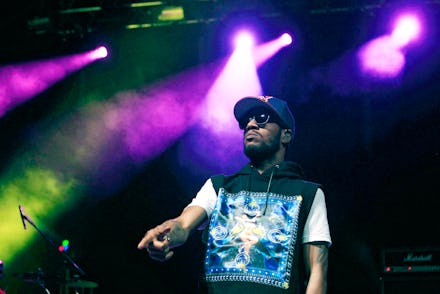Kid Cudi Thinks Hip-Hop Could Save Kids' Lives — If Only Rappers Took This Advice

Kid Cudi has serious beef with the state of modern hip-hop.
The 28-year-old Cleveland, Ohio, native appeared on the Arsenio Hall Show last week to air his grievances. His statement is aimed at his fellow rappers, and raises powerful questions about the culture’s responsibility to society as a whole:
“I think the braggadocio, ‘money, cash, hoes’ thing needs to be deaded,” Cudi tells Arsenio. “If you’re gonna be an artist, there’s a time where you just have to … embrace the responsibility and understand that the power of music is something so special. And to be able to do it on this magnitude where you reach millions of people, it’s like why not use that for good? Why not tell kids something that they can connect with and use in their lives?”
He continues: “My mission statement since day one … all I wanted to do was help kids not feel alone and stop kids from committing suicide.”
“Those two specific things – where does that come from?” asks Arsenio.
“Well,” Cudi replies, “I dealt with suicide for the past five years … and I know what that feels like. And I know it comes from loneliness, I know it comes from not having self worth, not loving yourself. And these are things that, you know, kids don’t have music that can coach them and give them that guidance.”
Wow. It’s important to note that rappers have faced this kind of criticism for a long time. Whether it was directed toward the explicit violence and misogyny of the gangsta rap era or the materialism of today, questions about hip-hop’s greater cultural “responsibility” have never been far away.
Cudi himself says as much: “I feel like [hip-hop materialism is] holding us back as a culture, as black people. It doesn’t advance us in any way, shape or form. We’ve been doing that same thing for years now.”
Image Credit: I Need Hip Hop
Arguments like this often miss key points. Hip-hop can be different things to different people: sometimes, a celebratory anthem about popping champagne in the club provides much needed therapeutic release. At other times, an incisive critique of police corruption is more appropriate and necessary. There’s room for both, and hip-hop as an art form should keep growing with both remaining in the conversation.
Such arguments also tend to mislay the blame for what’s really “holding us back.” One would be hard pressed to find proof that hip-hop causes any cultural woes that weren’t already in place before hip-hop even existed. If anything, hip-hop reflects and discusses these issues rather than causes them.
Finally, one must also consider hip-hop as a consumer product with a largely young, white and male fan base. The consumer demand for specific types of songs – including the hyper-materialistic kind – is largely rooted here, and should not be underestimated in terms of how it influences the music’s content.
Image Credit: Rap Music Management
But … At the same time, it’s hard to watch this music so frequently fail to capitalize on its potential to address more pressing social issues. Kid Cudi’s heartfelt testimony is the perfect embodiment of this.
As an artist who’s spoken openly about his battles with depression and the side effects of anti-depressants, Cudi is in a unique position to recognize how powerful music can be – and how much it can help people heal: “I didn’t have that [guidance]. I had to listen to Jay-Z and take certain things from it, and all the other [expletive] I didn’t know what he was talking about.”
Indeed, the gap between how frequently some mainstream hip-hop discusses money and how often it addresses the emotional and psychological problems many of its listeners face is stark. Rap Genius and Forbes informally charted this distinction and found what looks like an increase in how many money references the music contained over time.
Image Credit: Forbes
While this is far from a rigorously empirical study, it highlights a perception of the music that Cudi wishes to shift. If hip-hop can help guide kids through hard times, why don’t artists make more of an effort to do so? Should this music remain so driven by capital, or is there room for a wider range of issues to be addressed?
We know what Kid Cudi thinks. Time will tell if his peers heed his rallying cry.